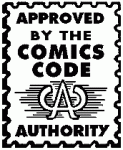Just shy of two years older than me, a symbol I’ve known all my life is disappearing. It’s the little thing on the cover of all the comic books I bought in my life, the stamp that read, “Approved by the Comics Code Authority.”
 The Comics Code Authority stemmed in large part from Congressional hearings on how comic books were corrupting the youth of America. The background is marvelously detailed in David Hadju’s The Ten-Cent Plague and in short form in a post by Glen Weldon over at the NPR blogs. Essentially, the attention and heat generated by those hearings and other complaints about the lurid comic book industry led to the October 1954 adoption of the Code of the Comics Magazine Association of America. Serving as “the basis for the comic magazine industry’s program of self-regulation,” it was enforced by the Comics Code Authority. As Weldon notes in his post, “publishers would submit their comics to the CCMA prior to publication and the CCMA would make recommendations for changes. The CCMA had no legal authority, but it could decide not to put its seal of approval on a book — and many distributors and stores would not stock a comic book without that seal[.]”
The Comics Code Authority stemmed in large part from Congressional hearings on how comic books were corrupting the youth of America. The background is marvelously detailed in David Hadju’s The Ten-Cent Plague and in short form in a post by Glen Weldon over at the NPR blogs. Essentially, the attention and heat generated by those hearings and other complaints about the lurid comic book industry led to the October 1954 adoption of the Code of the Comics Magazine Association of America. Serving as “the basis for the comic magazine industry’s program of self-regulation,” it was enforced by the Comics Code Authority. As Weldon notes in his post, “publishers would submit their comics to the CCMA prior to publication and the CCMA would make recommendations for changes. The CCMA had no legal authority, but it could decide not to put its seal of approval on a book — and many distributors and stores would not stock a comic book without that seal[.]”
Self-regulation, of course, was simply a newspeak way of saying self-censorship. The code sought to regulate the depiction of crime, horror and sex in the comic books, as well as the advertising that was acceptable. During most of my comics-buying days, of course, I was unaware the stamp meant the comics industry was so generously looking out for my interests. If anything, I thought it akin to the Good Housekeeping Seal of Approval and an affirmation of the excellence of the product.
Regardless of my understanding, here’s some of the code’s principles and goals in trying to protect me:
- If crime is depicted it shall be as a sordid and unpleasant activity.
- In every instance good shall triumph over evil and the criminal punished for his misdeeds.
- Inclusion of stories dealing with evil shall be used or shall be published only where the intent is to illustrate a moral issue and in no case shall evil be presented alluringly nor as to injure the sensibilities of the reader.
- Although slang and colloquialisms are acceptable, excessive use should be discouraged and wherever possible good grammar shall be employed.
- Respect for parents, the moral code, and for honorable behavior shall be fostered.
No doubt, my parents, like most others of the time, probably would have questioned whether comic books actually met that last item. Modern parents, though, will no longer have that assistance. The two last major comic book publishers — DC and Archie — say they will no longer carry the seal on their comics. (Archie, how could you?!?!)
Thank goodness this comes after both I and my kids are grown. Who knows how we might have been corrupted had it not been for that seal of approval?
The comic book medium, having come of age on the American cultural scene, must measure up to its responsibilities.
Preamble, Code of the Comics Magazine Association of America







